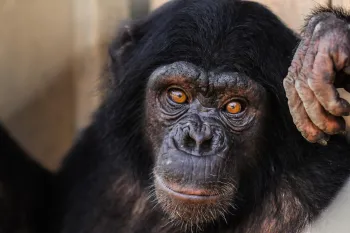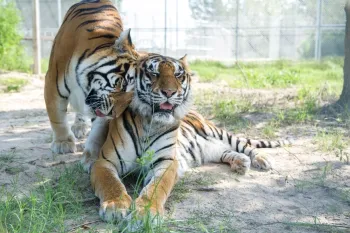Across the U.S., nearly 200 localities and a dozen states already restrict the use of some wild animals in traveling exhibits. As a result, circuses are using fewer wild animals, with some, like Ringling Bros. and Barnum & Bailey, going entirely animal-free. But more needs to be done. Even though Illinois was the first state in the U.S. to ban the use of elephants in circuses and traveling shows, it is still legal to force primates and other wild animals to perform. Here, Marc Ayers, Illinois state director for Humane World for Animals, tells us about efforts to extend protections to primates that would end spectacles like the Banana Derby, a traveling animal act that recently sparked public outcry in Sangamon County.
When the Sangamon County Fair in Illinois recently started to promote the Banana Derby, they called it “family fun” that was “hilarious” and “heartwarming.” But dozens of area residents disagreed: Comments on the fair’s social media post asked the fair to cancel the event. Others pledged to boycott if the Banana Derby went on.
Nothing about the Banana Derby is fun. It is undoubtedly frightening and harmful to the monkeys, who have no control over the dogs’ fast, abrupt and unpredictable movements—and no option but to hang on for dear life. And it cannot be safe for the dogs, either, as wild animals in such stressful situations could lash out in fear. Community members sent emails and made phone calls to try to stop the act. The social media post was then removed by the county fair, which we took as a hopeful sign.
To learn more about the exhibitor, I made a call to our captive wildlife department at Humane World for Animals. Within minutes, I was informed that the exhibitor was Phil Dolci (aka Phil Hendricks), a figure who often draws controversy at fairs and other venues. My colleagues shared with me his history of violations of the Animal Welfare Act, which is enforced by the U.S. Department of Agriculture. The most recent citation occurred in 2023 for failing to provide an appropriate environmental enhancement plan to protect the psychological well-being of capuchin monkeys, who are complex, intelligent animals. In previous years, he was cited for housing two capuchins in a tiny cage with only 3.8 square feet of floor space, and for keeping the monkeys confined completely alone, denying them their basic need to interact and socialize with other primates.
With the facts and USDA citations in hand, I called the chair of the Sangamon County Fair Board to share the exhibitor’s record and express our concerns.
But despite this and the public backlash, the Banana Derby was not canceled. I went to witness this “performance” firsthand.
Fairgoers looked on as two stressed capuchin monkeys were jostled and flung around a small track, strapped to the backs of dogs running in tight circles, lurching forward and sideways in response to the dogs’ sudden turns, abrupt stops and jumps. The monkeys repeatedly grasped at the guardrails as the dogs rounded the track. One of the dogs kept stopping to eat grass instead of racing. The whole display felt pathetic and cruel as expected; it felt embarrassing even being near it. That Sangamon County—and the state of Illinois—allowed this forced wild animal performance to continue is simply pitiful.
Astoundingly enough, the Banana Derby is just one spectacle that takes primates or other wild animals on the road to exploit them for entertainment. Hundreds of these traveling animal act exhibitors operate across the U.S., hauling monkeys, kangaroos, servals and other wild animals to fairs, schools, libraries and other venues for forced performances, photo ops and dangerous public encounters. And larger animals, too, such as elephants and big cats, continue to endure chaining, confinement and beatings with bullhooks, whips and prods for circuses across much of the country, where these practices still aren’t outlawed.
And yet so many people do not want these acts to continue. We have been at the forefront of the advocacy that achieved this progress, and we’re not about to stop. Since May 2024 alone, Maryland, Massachusetts and Washington have banned the use of nonhuman primates, elephants, big cats and bears in traveling acts. New York hosted the Banana Derby at the Orange County Fair as recently as 2023; the act was condemned as “mistreatment of animals” by a local official. New York is poised to advance legislation to ban the use of nonhuman primates and other wildlife in traveling acts next year, following its passage in the state senate earlier this year.
In 2017, our advocacy resulted in Illinois becoming the first state in the U.S. to ban the use of elephants in circuses and traveling shows. This ban gives me hope that the Illinois General Assembly and the governor will listen to all the residents who want to eradicate cruel displays like the Banana Derby and that policymakers will work with us once again—this time to end the cruel treatment of nonhuman primates and other wild animals in circuses and traveling acts.
Let’s show the world that keeping wild animals captive to force them to perform macabre spectacles is not something that we want to do; it’s not who we are, and it has no place in the humane world we’re trying to create together. Whether you live in Illinois or anywhere else, you can end traveling wild animal acts in your own community and urge Shriners International to do its part by adopting an animal-free circus policy for local chapters.
Marc Ayers is Illinois state director for Humane World for Animals.



